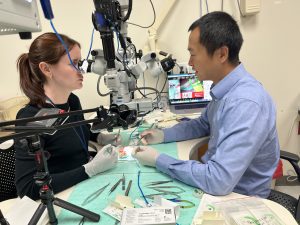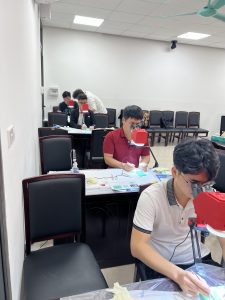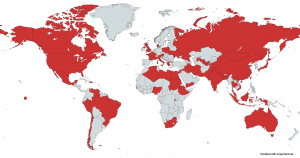Microsurgery is a specialized field within plastic surgery that uses precision instruments and an operating microscope to reconnect blood vessels, nerves and lymphatics. The field of microsurgery allows body parts to be rebuilt with one’s own tissue and can be performed on any part of the body. For example, microsurgery is used extensively in breast reconstruction, where tissue from the abdomen is moved to the chest to reconstruct the breast. Microsurgery is also used to reconnect digits that have been traumatically amputated and to reconnect lymphatic vessels to correct lymphedema. Microsurgery allows for precise tissue repair and improved functionality.

Microsurgery is a valuable and delicate skill which requires extensive training. Unfortunately, many trainees, both in the United States and around the world, do not have access to microsurgical education. In 2017, the Microsurgery and Regenerative Medicine (MSRM) Lab within the Division of Plastic Surgery began microsurgical training for trainees to help them gain confidence and competence in the operating room. This training involves dedicated time in the lab where trainees work one-on-one with an instructor so that they can receive immediate feedback in a low-pressure environment.
The MSRM Lab has been essential in teaching microsurgery to residents within the Department of Surgery and in expanding microsurgical education to places around the world. To do this, the lab had to find creative solutions to barriers, including developing portable 3D printed microscopes (patented by WARF) for its in-person trainings in resource-constrained countries as well as livestreaming microsurgical trainings to surgeons in the United States and abroad. Recently, the lab published an article titled “Livestreaming Microsurgery Education: An Avenue to Expand Global Plastic Surgery,” where its novel approach to virtual microsurgical teaching was highlighted.

“It is a privilege to have our team contribute to microsurgical training on a global scale,” said Dr. Samuel Poore, Chair of the Division of Plastic Surgery and Director of the MSRM Lab. “With our patented 3D printed microscope and the novel livestreaming platform, the impact of this program is growing worldwide.”
On a global scale, microsurgery is often taught through short, in-person workshops. Based on the UW–Madison Microsurgery Course, the MSRM team has taught formal microsurgical courses in Rwanda, Vietnam, South Africa, and Egypt. While these courses provide a basic foundation for microsurgery, trainees are often left wanting more training, but lack additional resources. To bridge this gap, Weifeng Zeng, MD, Scientist and Director of Microsurgery Education in the MSRM Lab, began a free livestream lecture series to teach microsurgery worldwide. To date, people from over 44 countries have joined these microsurgery livestream sessions.
“Dr. Zeng is a master educator,” Dr. Poore said. “He is innovative, patient and is quickly becoming the world authority on microsurgical education. His impact is palpable. He is the perfect individual to lead this impactful program.”
The livestream uses a three-camera system that was developed to capture all aspects of a microsurgeon’s maneuvers throughout a teaching session. From October 2022 to November 2024, Dr. Zeng taught 137 microsurgical livestream sessions over social media platforms (Zoom, YouTube, and Instagram), which were chosen for global accessibility and ease of use. Participants were also able to ask real-time questions throughout the trainings. These microsurgical trainings were advertised on the Microsurgery practice with Weifeng Zeng Facebook Group, which currently has 1,400 members and continues to grow. In addition, the Microsurgery Education – UW Madison YouTube Channel livestreams trainings with medical students and posts additional microsurgical training videos.

Now, after livestreaming these sessions for two years, the MSRM Lab is moving into the next phase of training. This involves creating smaller subgroups within the Facebook group based on the participants’ country. During this next phase, trainings will be tailored to the specific needs of these individual groups. Overall, the goal is to not only teach people microsurgical techniques, but to teach them how to become teachers, so they can share these techniques with others.
“Working as a team consisting of Aaron Dingle and Weifeng Zeng, we have been able to partner with various NGOs (SHARE, Nuoy) to deliver microsurgical education in the developing world,” Dr. Poore said. “This team is inspirational in their commitment to giving back.”